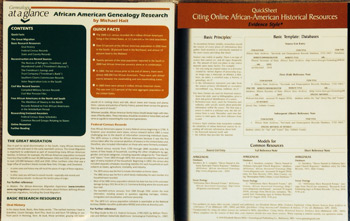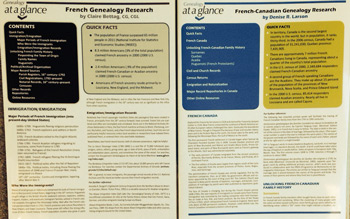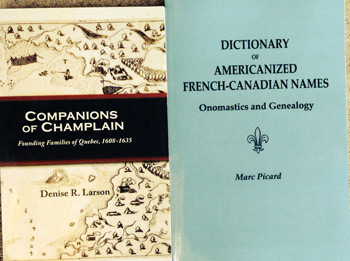This weekend Family Roots Publishing is running a 25% off sale on three 2-item bundles of popular ethnic-oriented items. One bundle is African-American related, and the other two are French and French-Canadian guides. This sale runs through midnight EDT (Not MDT) Monday, October 28, 2013. All six items are also available individually at 10% off during the promotion. Click on the linked individual titles to go to the page for any particular item.
Bundle of Two African-American Quick Reference Items (Bundle06)
This bundle is made up of two popular 4-page laminated quick-reference items for genealogists. The bundle is made up of the following two items:
Genealogy at a Glance: African American Genealogy Research; by Michael Hait; 4 pp; 2011; Laminated, folded sheet; ISBN: 9780806318820; 8.5×11; Item # GPC2476
Nothing will get you going faster in African American genealogical research than this “Genealogy at a Glance” publication. In just four pages, Michael Hait, lays out the basic elements of African American research, boiling the subject down to its essence and allowing you to grasp the fundamentals of African American research at a glance.
Hait explains that there are three imperatives in African American genealogical research: (1) you must begin with interviews of family members; (2) you must check records of birth, marriage, and death; and (3) you must check federal census records, especially the crucial 1870 census, which was the first census to include information on former slaves.
Beyond this he offers step-by-step guidance on finding and using other records that are crucial in African American research, such as Freedmen’s Bureau records, Freedman’s Bank records, records of the Southern Claims Commission, and voter registration lists. In addition, before ending with a helpful list of websites focusing specifically on African American genealogy, he offers tips and guidance on researching slave ancestors.
In keeping with the “Genealogy at a Glance” theme, the four specially laminated pages of this work are designed to provide as much useful information in the space allotted as you’ll ever need. No research tool in genealogy is as effortless and as convenient.
“Genealogy at a Glance: African American Genealogy Research” Book Review
Contents for this guide:
- The Great Migration
- Basic Research Resources
- Oral History
- Federal Census Records
- State and County Records
- Reconstruction-era Record Sources
- The Bureau of Refugees, Freedmen, and Abandoned Lands (“Freedmen’s Bureau”)
- The Freedman’s Saving and Trust Company (“Freedman’s Bank”)
- Southern Claims Commission Records
- Voter Registration Lists in the South
- Civil War Record Resources
- Compiled Military Service Records
- Civil War Pension Files
- Free African Americans in the North and South
- The Abolition of Slavery in the North
- Records Related to Free African Americans
- in the Antebellum Period
- Researching Enslaved Ancestors
- Federal Census Slave Schedules
- Common Record Groups Relating to Slaves
- Online Resources
- Further Reading
- Immigration/Emigration
- Major Periods of French Immigration
- Who Were the Immigrants
- Emigration/Immigration Records
- Unlocking French Family History
- Pinpointing the Town of Origin
- Family Names
- Huguenots
- Political/Archival Organization
- Major Record Sources
- Parish Registers, 16th century–1792
- Civil Registrations, 1792–present
- Notarial Records, 16th century–present
- Censuses
- Other Records
- Repositorties
QuickSheet: Citing Online African-American Historical Resources Evidence! Style; by Elizabeth Shown Mills; Published 2010; 8.5×11″; 4 pp. folded; Laminated, ISBN: 9780806318714; Item # GPC3863
Citing Online African-American Historical Resources fits squarely in the tradition of Mrs. Mills’ acclaimed QuickSheets, which are used by genealogists everywhere as a guide for citing online sources.
The basic citation models given here help researchers evaluate the reliability of online historical sources by recording all relevant information about both the historical material itself and the website that provides the material.
In citing online historical sources Mrs. Mills offers two basic style formats:
Source-list style, used in bibliographies, gives a short and general identification of a source.
Reference-note style, used for footnotes and endnotes, adds specific details about particular information within the source.
With this basic template, the African-American QuickSheet provides models for citing common resources such as databases, image copies, transcripts, blogs, books, and articles, using the widely accepted citation principles established in the QuickSheet series. Arranged in tabular format, the sample citations are easy to follow and can be applied to your specific needs in citing your sources.
While it provides standards for citing online sources, this QuickSheet is, of course, tailored to the African-American experience, so source citation models bear on subjects such as slave manifests, slave narratives, Freedmen’s Bureau records, and slave census schedules. This QuickSheet is a laminated four-sided sheet designed for heavy use.
“African-American Historical Resources” Book Review
To purchase the above bundle for 25% off at just 13.46 (plus $4.50 USA p&H), click here.
This sale runs through midnight EDT (Not MDT) Monday, October 28, 2013. All six items are also available individually at 10% off during the promotion. Click on the linked individual titles to go to the page for any particular item.
Bundle of Two French-related Quick Reference Items (Bundle07)
This bundle is made up of two popular “Genealogy at a Glance” laminated quick-reference guides. They are:
Genealogy at a Glance: French Genealogy Research by Claire Bettag; 4 pp; 2012; Laminated, folded sheet; ISBN: 9780806318899; 8.5×11; Item # GPC479
We start with a couple of interesting facts: 8.3 million Americans (3% of the total population) claimed French ancestry in the 2000 U.S. census, and 2.4 million Americans (0.9% of the population) claimed French-Canadian ancestry. Thus, with over 10 million Americans of French origin, this research guide was almost inevitable, and in true Genealogy at a Glance fashion, it lays out the basic elements of French research in just four pages, boiling the subject down to its essence and allowing you to grasp the fundamentals of French genealogical research at a glance.
Consisting of Huguenots, Acadian refugees, and political exiles, the French contingent in America has always been viewed as a distinct element in the population, concentrated for the most part in Louisiana, New England, and the Midwest. Connecting these individuals to France and tracing them back through the earliest records, is the particular challenge of this research guide.
French research, we learn, starts with the vital records of birth, marriage, and death. These records fall into two categories: parish registers before 1792 and civil registrations after 1792. Because most records used initially in French research were created at the town level, identifying an ancestor’s town of origin is critical. Once determined (with tips given here to make it easier), research is generally conducted in the rich collections of departmental archives, including notarial records and censuses that are gradually being digitized and placed online. Municipal archives and libraries are rapidly digitizing their records as well, and the final section of this paper concludes with a list of helpful websites. The four specially laminated pages of this work are designed to provide as much useful information in the space allotted as you’ll ever need. No research tool in French genealogy is as effortless and as convenient.
Contents
“French Genealogy Research”Book Review
———————————————
Genealogy at a Glance: French-Canadian Genealogy Research; by Denise R. Larson; 4 pp. folded; 8.5 x 11; Published: 2011; Laminated, ISBN: 9780806318745; Item # GPC3286
French-Canadian genealogical research has never been so easy. In just four pages, Denise R. Larson, lays out the basic elements of French-Canadian research, boiling the subject down to its essence and allowing you to grasp the fundamentals of French-Canadian research at a glance.
In keeping with the Genealogy at a Glance theme, the four specially laminated pages of this work are designed to give you as much useful information in the space allotted as you’ll ever need.
Focusing on key record sources and materials for further reference, Larson first provides history and context, then deals with the unique aspects of French-Canadian research such as Acadia and Quebec before moving on to traditional record sources, finishing with a summing up of record repositories and online sources. In less than a handful of pages she provides all the basic instruction you need in order to begin and to proceed successfully with your research.
Genealogy at a Glance:“French-Canadian Genealogy Research” Book Review
To purchase the above bundle at 25% off for just $13.46 (plus $4.50 USA p&h), click here.
This sale runs through midnight EDT (Not MDT) Monday, October 28, 2013. All six items are also available individually at 10% off during the promotion. Click on the linked individual titles to go to the page for any particular item.
_____________________________________________
Bundle of Two French-Canadian Related Books (Bundle08)
The following two popular French-Canadian related books are bundled at a special price. The books are:
Dictionary of Americanized French-Canadian Names: Onomastics and Genealogy; by Marc Picard; xviii + 170 pp; Paper; Published: 2013; ISBN: 9780806356457; Item # CF8465
Name expert Marc Picard’s latest book is must reading for anyone with French-Canadian ancestry (or for institutions serving such a population). Monsieur Picard, who has previously written about the etymologies of the French migrants who settled Quebec and Acadia in the 17th and 18th centuries, now follows the spread of those surnames to various English-speaking parts of North America in his Dictionary of Americanized French-Canadian Names. Besides its derivations and Anglicizations, this terrific resource references the first French-Canadian settlers bearing the names found in the dictionary.
Professor Picard explains the development of French-Canadian surnames and their subsequent “Americanization” in his twelve-page Introduction, which, among other things, discusses various kinds of Anglicization, direct translations, partial translation, and mistranslations of French into English. For instance, did you know that Americans named Blair may have inherited their surname from a Canadian named Belair (one of several place-names in France); that the Americanized “Bushey” comes from Boissy; or that Greenwood may have originally been Boisvert? Similarly, while On the Road author, Jack Kerouac, retained his French surname, persons with the American version “Curwick” may have the same ancestors. The last name of former Dallas Cowboys coach Tom Landry comes directly from the French; however, that surname also shows up in the U.S. as Landrey, Landrie, Laundra, Laundre, Laundrie, Laundry, Londeree, Londrie, and Londry. And some Americanizations are phonetically predictable, as in Maurice/Morris, Meilleur/Miller; or Sylvestre/Sylvester; others, however, are less so, as in “Sharkey” from Chartier, Butler from Breton, or Wells from Dupuis.
Each of the thousands of entries in the Dictionary of Americanized French-Canadian Names contains two parts. The first of these is onomastic in nature, providing the etymology of the surname and any Americanized variants from which they stem. The second part contains some or all of the following information: the name of the first French-Canadian bearer of the name, the name of his parents, his place of origin in France, the name of his spouse and the names of her parents, and the place of his marriage. In addition to the Introduction and the dictionary itself, readers will find a brief list of abbreviations used throughout the text and a detailed bibliography of sources.
____________________________________
Companions of Champlain: Founding Families of Quebec, 1608-1635; by Denise Larson; x + 179 pp; Paper; 5.5×8.5; Published: 2008, Reprinted: 2009; ISBN: 9780806353678; Item # CF9914
Drawing on primary and reliable secondary sources, this work provides readers with a concise historical overview of the founding of Quebec and French-Canadian culture. It also supplies readers with the research tools necessary to link their family lines with those of the original 18 pioneer families who inhabited Quebec during the lifetime of the city’s founder, Samuel de Champlain. Companions of Champlain was produced to honor the 400th anniversary of the founding of Quebec City and to enable North Americans on both sides of the border to appreciate more fully their French-Canadian heritage.
Companions of Champlain explains in clear language the reasons for the New-World explorations of Samuel de Champlain in the 1600s and the unique culture that resulted from the establishment of a trading post in the wilds of North America in 1608. It is the story of the habitant family-the farm and daily life-not the complex intrigues of the French king and court, though some historical background information is included. The historical backdrop for Companions of Champlain was drawn from the few extant primary sources of the early 17th century, most particularly Champlain’s Voyages, Marc Lescarbot’s Nova Francia and Jesuit Relations, and standard references such as H. P. Biggar’s Works of Samuel de Champlain and Gustave Lanctot’s A History of Canada.
Although Champlain and his wife, Helene Boulle, did not have children, his companions did. The original 18 pioneer families who inhabited Quebec during Champlain’s lifetime formed the nucleus of French-Canadian culture from which a new society sprang. They are the focal point of this work. The author traces the genealogy for three generations of the following 18 founding families: Amiot/Amyot, Boucher, Bourdon, Cloutier, Cote/Coste, Couillard/Couillart, Delaunay, Desportes, Giffard, Guyon, Hebert (Quebec’s first colonial family, Hebert, is followed through five generations), Juchereau, Langlois, Marsolet, Martin, Nicolet, Pinguet, and Tardif/Letardif. The author also presents a methodology by which readers can trace their lineage in a quest to link with one of Quebec’s founding families. Genealogical chart information was extracted from documents and records held at the Archives nationales du Quebec; in city, state, parochial, and provincial offices; and from reliable secondary sources, such as the genealogical dictionaries of Cyprien Tanguay and Rene Jette.
Other important features of this groundbreaking work include maps, an illustration of Champlain’s 1603 astrolabe, references, five appendices, lineage and pedigree charts with citations, and a comprehensive index. Appendices provide a glossary of French genealogical terminology and an example of citation notation for use when filling in ancestral charts, one of which is provided for reproduction. The full-reference citation method described in the book is unique in that it is keyed from the numbering sequence on commonly used charts and does not require the superscripts and complex systems often found in genealogy.
To purchase the above bundle at 25% off for just $35.21 (plus $5.50 USA p&h), click here.
This sale runs through midnight EDT (Not MDT) Monday, October 28, 2013. All six items are also available individually at 10% off during the promotion. Click on the linked individual titles to go to the page for any particular item.


